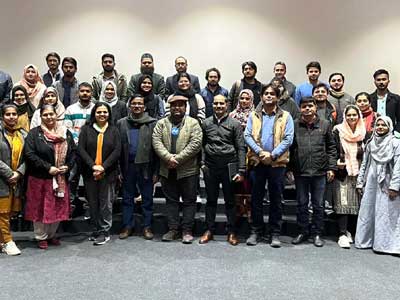Aligarh: "In the technological world, we live in, many of us use social media sites like Facebook, Twitter, Snapchat, YouTube, and Instagram to find friends and talk to them. Even though these sites have their own advantages, it is important to remember that social media can never replace real-life interactions, and spending too much time on them can make you feel lonelier and can also cause mental health issues like anxiety, depression, ADHD, emotional vulnerability, etc.", said Prof Suneetha B. Manyam of Mercer University from Georgia.
She was delivering an invited lecture on "Social Media and Mental Health" at the Frank and Debbie Islam Auditorium, organized by the Department of Mass Communication, Aligarh Muslim University on January 27.
A clinical counselor and a senior research fellow at Foundation for Evidence-based Research in India, Prof Manyam spoke at length on the mental implication of social media among citizens, especially youth. She discussed several issues including anxiety, depression, lack of focus, and other complexes prevalent among youth, and how mental health was challenged during the Covid-19 pandemic.
She also underlined counseling techniques to deal with anxiety and depression caused by social media and suggested meditation, mindfulness techniques, having a family talk, outdoor walks, etc. in order to overcome the negative impact of social media.
The Secretary of FEDI, Dr. Daud Salim Faruquie emphasized the significance of such events in view of the social media dominating our lives.
Prof Pitabas Pradhan, Chairman of the department, welcomed the guest speaker and Dr. Huma Parveen conducted the programme.














Related Items
Agra University struggles to restore its fading reputation
Education firms should embrace candidates' social media screening
Managers without emotional intelligence are more manipulative